A Reflective Account of Learning in Business Operations & Management
VerifiedAdded on 2023/06/11
|9
|2552
|218
AI Summary
This is a reflective account of learning from the first and second semesters of a Business Operations and Management module. It utilizes the Gibbs Reflective Cycle to analyze experiences, focusing on business ethics, consumer experience, and the impact of management issues. The reflection covers group activities, time management challenges, and confidence levels. Key learnings include the importance of time management, understanding personal strengths and weaknesses, and developing action plans for improvement. The account details the student's feelings, evaluations, and analysis of their academic journey, culminating in a structured plan to enhance both professional and personal skills. Desklib provides a platform for students to access this and similar assignments for study and learning.
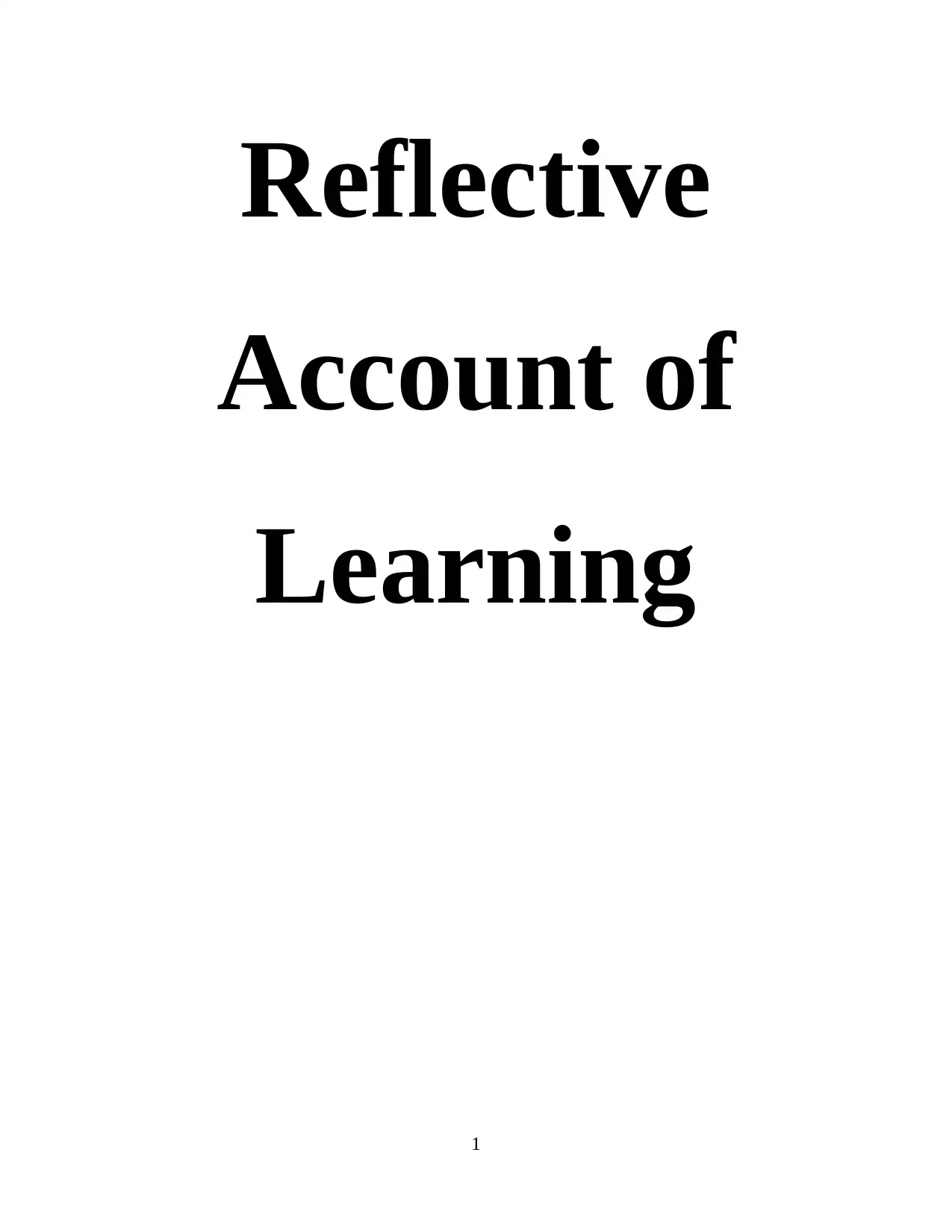
Reflective
Account of
Learning
1
Account of
Learning
1
Paraphrase This Document
Need a fresh take? Get an instant paraphrase of this document with our AI Paraphraser
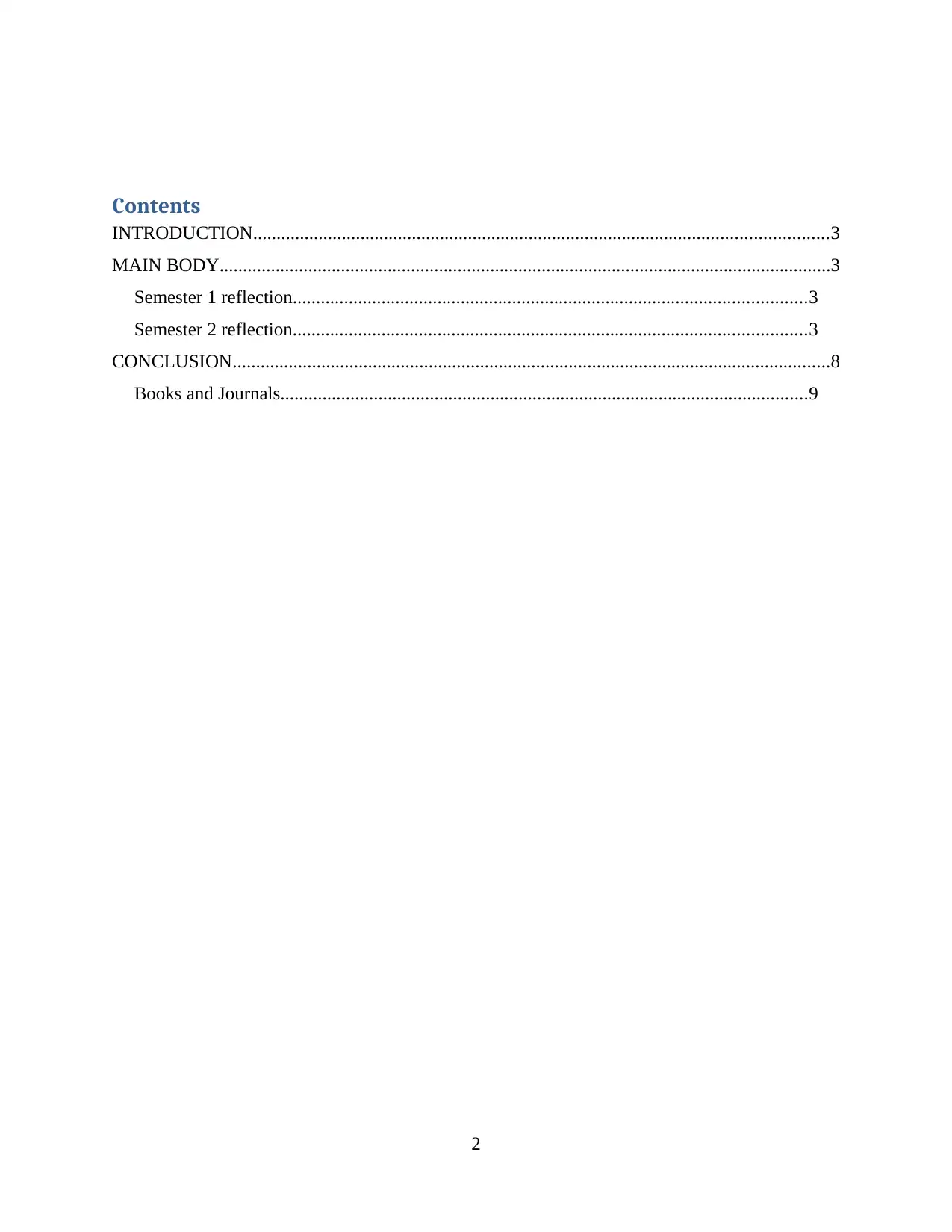
Contents
INTRODUCTION...........................................................................................................................3
MAIN BODY...................................................................................................................................3
Semester 1 reflection..............................................................................................................3
Semester 2 reflection..............................................................................................................3
CONCLUSION................................................................................................................................8
Books and Journals.................................................................................................................9
2
INTRODUCTION...........................................................................................................................3
MAIN BODY...................................................................................................................................3
Semester 1 reflection..............................................................................................................3
Semester 2 reflection..............................................................................................................3
CONCLUSION................................................................................................................................8
Books and Journals.................................................................................................................9
2
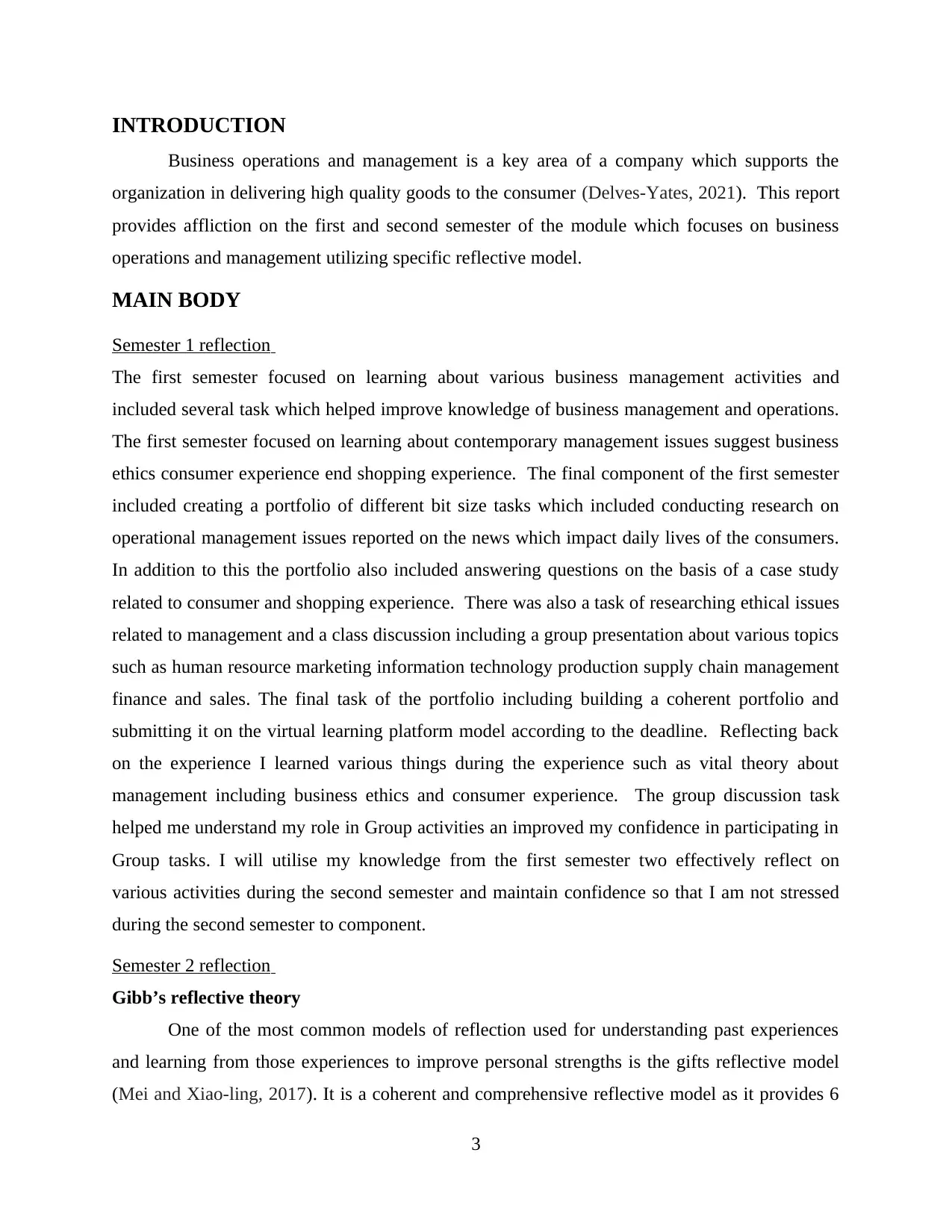
INTRODUCTION
Business operations and management is a key area of a company which supports the
organization in delivering high quality goods to the consumer (Delves-Yates, 2021). This report
provides affliction on the first and second semester of the module which focuses on business
operations and management utilizing specific reflective model.
MAIN BODY
Semester 1 reflection
The first semester focused on learning about various business management activities and
included several task which helped improve knowledge of business management and operations.
The first semester focused on learning about contemporary management issues suggest business
ethics consumer experience end shopping experience. The final component of the first semester
included creating a portfolio of different bit size tasks which included conducting research on
operational management issues reported on the news which impact daily lives of the consumers.
In addition to this the portfolio also included answering questions on the basis of a case study
related to consumer and shopping experience. There was also a task of researching ethical issues
related to management and a class discussion including a group presentation about various topics
such as human resource marketing information technology production supply chain management
finance and sales. The final task of the portfolio including building a coherent portfolio and
submitting it on the virtual learning platform model according to the deadline. Reflecting back
on the experience I learned various things during the experience such as vital theory about
management including business ethics and consumer experience. The group discussion task
helped me understand my role in Group activities an improved my confidence in participating in
Group tasks. I will utilise my knowledge from the first semester two effectively reflect on
various activities during the second semester and maintain confidence so that I am not stressed
during the second semester to component.
Semester 2 reflection
Gibb’s reflective theory
One of the most common models of reflection used for understanding past experiences
and learning from those experiences to improve personal strengths is the gifts reflective model
(Mei and Xiao-ling, 2017). It is a coherent and comprehensive reflective model as it provides 6
3
Business operations and management is a key area of a company which supports the
organization in delivering high quality goods to the consumer (Delves-Yates, 2021). This report
provides affliction on the first and second semester of the module which focuses on business
operations and management utilizing specific reflective model.
MAIN BODY
Semester 1 reflection
The first semester focused on learning about various business management activities and
included several task which helped improve knowledge of business management and operations.
The first semester focused on learning about contemporary management issues suggest business
ethics consumer experience end shopping experience. The final component of the first semester
included creating a portfolio of different bit size tasks which included conducting research on
operational management issues reported on the news which impact daily lives of the consumers.
In addition to this the portfolio also included answering questions on the basis of a case study
related to consumer and shopping experience. There was also a task of researching ethical issues
related to management and a class discussion including a group presentation about various topics
such as human resource marketing information technology production supply chain management
finance and sales. The final task of the portfolio including building a coherent portfolio and
submitting it on the virtual learning platform model according to the deadline. Reflecting back
on the experience I learned various things during the experience such as vital theory about
management including business ethics and consumer experience. The group discussion task
helped me understand my role in Group activities an improved my confidence in participating in
Group tasks. I will utilise my knowledge from the first semester two effectively reflect on
various activities during the second semester and maintain confidence so that I am not stressed
during the second semester to component.
Semester 2 reflection
Gibb’s reflective theory
One of the most common models of reflection used for understanding past experiences
and learning from those experiences to improve personal strengths is the gifts reflective model
(Mei and Xiao-ling, 2017). It is a coherent and comprehensive reflective model as it provides 6
3
⊘ This is a preview!⊘
Do you want full access?
Subscribe today to unlock all pages.

Trusted by 1+ million students worldwide
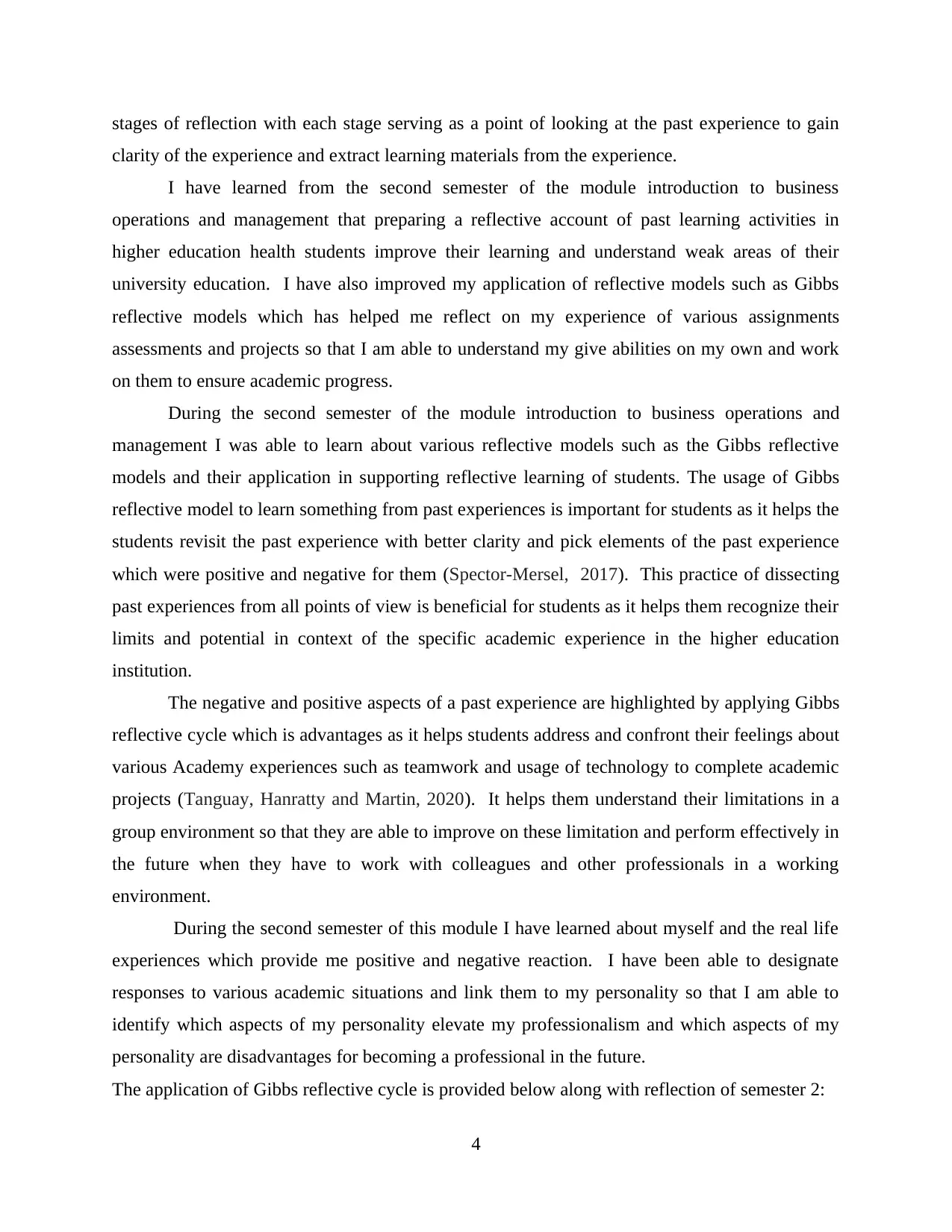
stages of reflection with each stage serving as a point of looking at the past experience to gain
clarity of the experience and extract learning materials from the experience.
I have learned from the second semester of the module introduction to business
operations and management that preparing a reflective account of past learning activities in
higher education health students improve their learning and understand weak areas of their
university education. I have also improved my application of reflective models such as Gibbs
reflective models which has helped me reflect on my experience of various assignments
assessments and projects so that I am able to understand my give abilities on my own and work
on them to ensure academic progress.
During the second semester of the module introduction to business operations and
management I was able to learn about various reflective models such as the Gibbs reflective
models and their application in supporting reflective learning of students. The usage of Gibbs
reflective model to learn something from past experiences is important for students as it helps the
students revisit the past experience with better clarity and pick elements of the past experience
which were positive and negative for them (Spector-Mersel, 2017). This practice of dissecting
past experiences from all points of view is beneficial for students as it helps them recognize their
limits and potential in context of the specific academic experience in the higher education
institution.
The negative and positive aspects of a past experience are highlighted by applying Gibbs
reflective cycle which is advantages as it helps students address and confront their feelings about
various Academy experiences such as teamwork and usage of technology to complete academic
projects (Tanguay, Hanratty and Martin, 2020). It helps them understand their limitations in a
group environment so that they are able to improve on these limitation and perform effectively in
the future when they have to work with colleagues and other professionals in a working
environment.
During the second semester of this module I have learned about myself and the real life
experiences which provide me positive and negative reaction. I have been able to designate
responses to various academic situations and link them to my personality so that I am able to
identify which aspects of my personality elevate my professionalism and which aspects of my
personality are disadvantages for becoming a professional in the future.
The application of Gibbs reflective cycle is provided below along with reflection of semester 2:
4
clarity of the experience and extract learning materials from the experience.
I have learned from the second semester of the module introduction to business
operations and management that preparing a reflective account of past learning activities in
higher education health students improve their learning and understand weak areas of their
university education. I have also improved my application of reflective models such as Gibbs
reflective models which has helped me reflect on my experience of various assignments
assessments and projects so that I am able to understand my give abilities on my own and work
on them to ensure academic progress.
During the second semester of the module introduction to business operations and
management I was able to learn about various reflective models such as the Gibbs reflective
models and their application in supporting reflective learning of students. The usage of Gibbs
reflective model to learn something from past experiences is important for students as it helps the
students revisit the past experience with better clarity and pick elements of the past experience
which were positive and negative for them (Spector-Mersel, 2017). This practice of dissecting
past experiences from all points of view is beneficial for students as it helps them recognize their
limits and potential in context of the specific academic experience in the higher education
institution.
The negative and positive aspects of a past experience are highlighted by applying Gibbs
reflective cycle which is advantages as it helps students address and confront their feelings about
various Academy experiences such as teamwork and usage of technology to complete academic
projects (Tanguay, Hanratty and Martin, 2020). It helps them understand their limitations in a
group environment so that they are able to improve on these limitation and perform effectively in
the future when they have to work with colleagues and other professionals in a working
environment.
During the second semester of this module I have learned about myself and the real life
experiences which provide me positive and negative reaction. I have been able to designate
responses to various academic situations and link them to my personality so that I am able to
identify which aspects of my personality elevate my professionalism and which aspects of my
personality are disadvantages for becoming a professional in the future.
The application of Gibbs reflective cycle is provided below along with reflection of semester 2:
4
Paraphrase This Document
Need a fresh take? Get an instant paraphrase of this document with our AI Paraphraser
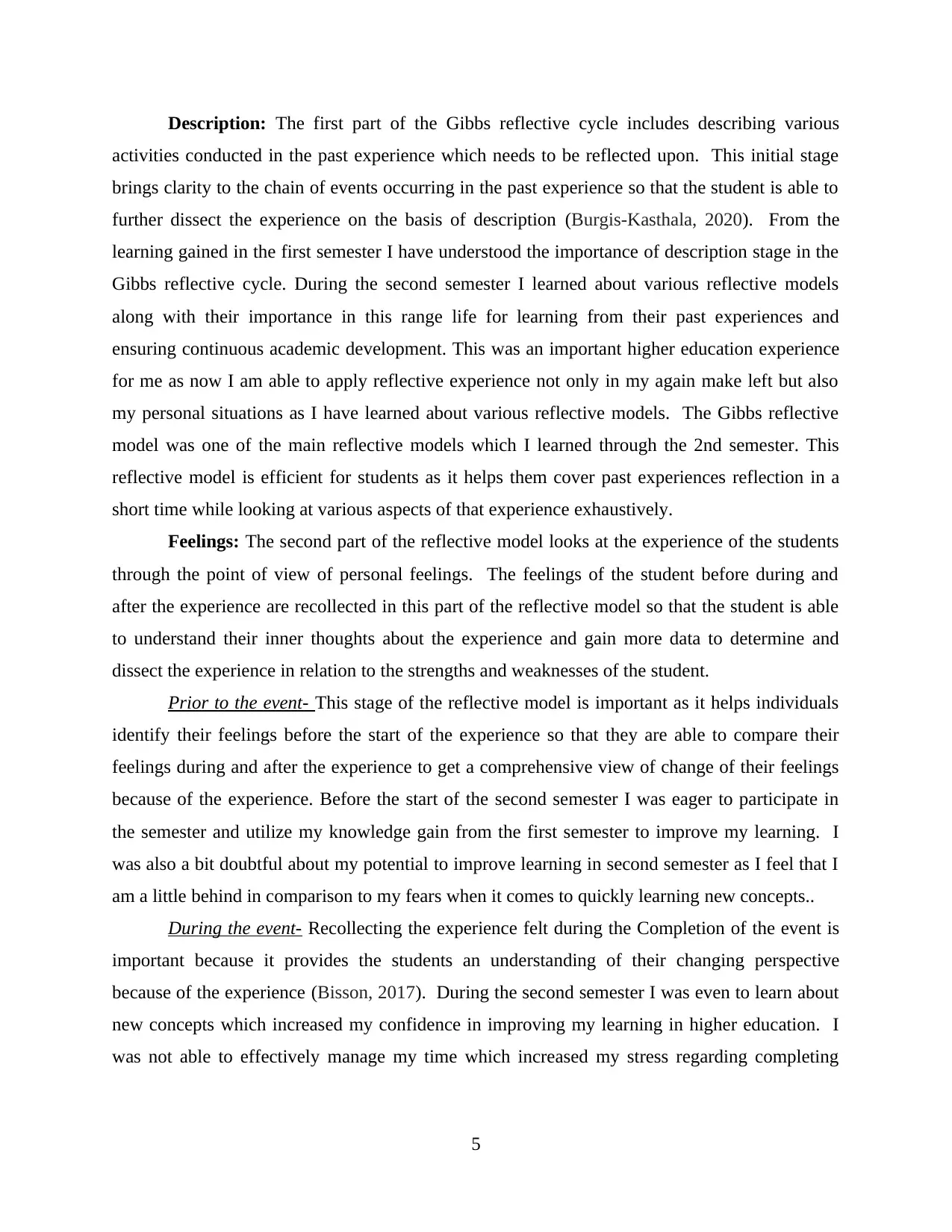
Description: The first part of the Gibbs reflective cycle includes describing various
activities conducted in the past experience which needs to be reflected upon. This initial stage
brings clarity to the chain of events occurring in the past experience so that the student is able to
further dissect the experience on the basis of description (Burgis-Kasthala, 2020). From the
learning gained in the first semester I have understood the importance of description stage in the
Gibbs reflective cycle. During the second semester I learned about various reflective models
along with their importance in this range life for learning from their past experiences and
ensuring continuous academic development. This was an important higher education experience
for me as now I am able to apply reflective experience not only in my again make left but also
my personal situations as I have learned about various reflective models. The Gibbs reflective
model was one of the main reflective models which I learned through the 2nd semester. This
reflective model is efficient for students as it helps them cover past experiences reflection in a
short time while looking at various aspects of that experience exhaustively.
Feelings: The second part of the reflective model looks at the experience of the students
through the point of view of personal feelings. The feelings of the student before during and
after the experience are recollected in this part of the reflective model so that the student is able
to understand their inner thoughts about the experience and gain more data to determine and
dissect the experience in relation to the strengths and weaknesses of the student.
Prior to the event- This stage of the reflective model is important as it helps individuals
identify their feelings before the start of the experience so that they are able to compare their
feelings during and after the experience to get a comprehensive view of change of their feelings
because of the experience. Before the start of the second semester I was eager to participate in
the semester and utilize my knowledge gain from the first semester to improve my learning. I
was also a bit doubtful about my potential to improve learning in second semester as I feel that I
am a little behind in comparison to my fears when it comes to quickly learning new concepts..
During the event- Recollecting the experience felt during the Completion of the event is
important because it provides the students an understanding of their changing perspective
because of the experience (Bisson, 2017). During the second semester I was even to learn about
new concepts which increased my confidence in improving my learning in higher education. I
was not able to effectively manage my time which increased my stress regarding completing
5
activities conducted in the past experience which needs to be reflected upon. This initial stage
brings clarity to the chain of events occurring in the past experience so that the student is able to
further dissect the experience on the basis of description (Burgis-Kasthala, 2020). From the
learning gained in the first semester I have understood the importance of description stage in the
Gibbs reflective cycle. During the second semester I learned about various reflective models
along with their importance in this range life for learning from their past experiences and
ensuring continuous academic development. This was an important higher education experience
for me as now I am able to apply reflective experience not only in my again make left but also
my personal situations as I have learned about various reflective models. The Gibbs reflective
model was one of the main reflective models which I learned through the 2nd semester. This
reflective model is efficient for students as it helps them cover past experiences reflection in a
short time while looking at various aspects of that experience exhaustively.
Feelings: The second part of the reflective model looks at the experience of the students
through the point of view of personal feelings. The feelings of the student before during and
after the experience are recollected in this part of the reflective model so that the student is able
to understand their inner thoughts about the experience and gain more data to determine and
dissect the experience in relation to the strengths and weaknesses of the student.
Prior to the event- This stage of the reflective model is important as it helps individuals
identify their feelings before the start of the experience so that they are able to compare their
feelings during and after the experience to get a comprehensive view of change of their feelings
because of the experience. Before the start of the second semester I was eager to participate in
the semester and utilize my knowledge gain from the first semester to improve my learning. I
was also a bit doubtful about my potential to improve learning in second semester as I feel that I
am a little behind in comparison to my fears when it comes to quickly learning new concepts..
During the event- Recollecting the experience felt during the Completion of the event is
important because it provides the students an understanding of their changing perspective
because of the experience (Bisson, 2017). During the second semester I was even to learn about
new concepts which increased my confidence in improving my learning in higher education. I
was not able to effectively manage my time which increased my stress regarding completing
5
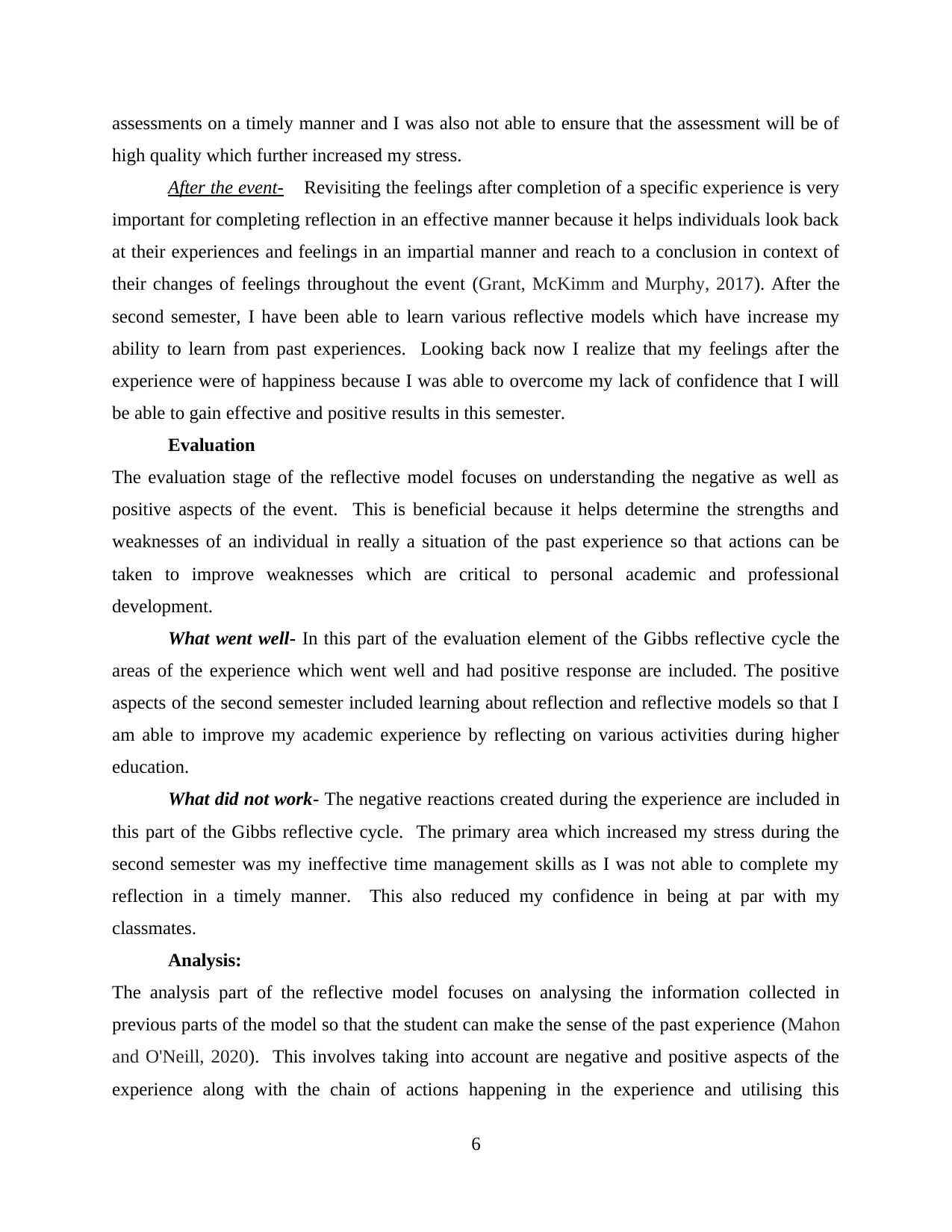
assessments on a timely manner and I was also not able to ensure that the assessment will be of
high quality which further increased my stress.
After the event- Revisiting the feelings after completion of a specific experience is very
important for completing reflection in an effective manner because it helps individuals look back
at their experiences and feelings in an impartial manner and reach to a conclusion in context of
their changes of feelings throughout the event (Grant, McKimm and Murphy, 2017). After the
second semester, I have been able to learn various reflective models which have increase my
ability to learn from past experiences. Looking back now I realize that my feelings after the
experience were of happiness because I was able to overcome my lack of confidence that I will
be able to gain effective and positive results in this semester.
Evaluation
The evaluation stage of the reflective model focuses on understanding the negative as well as
positive aspects of the event. This is beneficial because it helps determine the strengths and
weaknesses of an individual in really a situation of the past experience so that actions can be
taken to improve weaknesses which are critical to personal academic and professional
development.
What went well- In this part of the evaluation element of the Gibbs reflective cycle the
areas of the experience which went well and had positive response are included. The positive
aspects of the second semester included learning about reflection and reflective models so that I
am able to improve my academic experience by reflecting on various activities during higher
education.
What did not work- The negative reactions created during the experience are included in
this part of the Gibbs reflective cycle. The primary area which increased my stress during the
second semester was my ineffective time management skills as I was not able to complete my
reflection in a timely manner. This also reduced my confidence in being at par with my
classmates.
Analysis:
The analysis part of the reflective model focuses on analysing the information collected in
previous parts of the model so that the student can make the sense of the past experience (Mahon
and O'Neill, 2020). This involves taking into account are negative and positive aspects of the
experience along with the chain of actions happening in the experience and utilising this
6
high quality which further increased my stress.
After the event- Revisiting the feelings after completion of a specific experience is very
important for completing reflection in an effective manner because it helps individuals look back
at their experiences and feelings in an impartial manner and reach to a conclusion in context of
their changes of feelings throughout the event (Grant, McKimm and Murphy, 2017). After the
second semester, I have been able to learn various reflective models which have increase my
ability to learn from past experiences. Looking back now I realize that my feelings after the
experience were of happiness because I was able to overcome my lack of confidence that I will
be able to gain effective and positive results in this semester.
Evaluation
The evaluation stage of the reflective model focuses on understanding the negative as well as
positive aspects of the event. This is beneficial because it helps determine the strengths and
weaknesses of an individual in really a situation of the past experience so that actions can be
taken to improve weaknesses which are critical to personal academic and professional
development.
What went well- In this part of the evaluation element of the Gibbs reflective cycle the
areas of the experience which went well and had positive response are included. The positive
aspects of the second semester included learning about reflection and reflective models so that I
am able to improve my academic experience by reflecting on various activities during higher
education.
What did not work- The negative reactions created during the experience are included in
this part of the Gibbs reflective cycle. The primary area which increased my stress during the
second semester was my ineffective time management skills as I was not able to complete my
reflection in a timely manner. This also reduced my confidence in being at par with my
classmates.
Analysis:
The analysis part of the reflective model focuses on analysing the information collected in
previous parts of the model so that the student can make the sense of the past experience (Mahon
and O'Neill, 2020). This involves taking into account are negative and positive aspects of the
experience along with the chain of actions happening in the experience and utilising this
6
⊘ This is a preview!⊘
Do you want full access?
Subscribe today to unlock all pages.

Trusted by 1+ million students worldwide
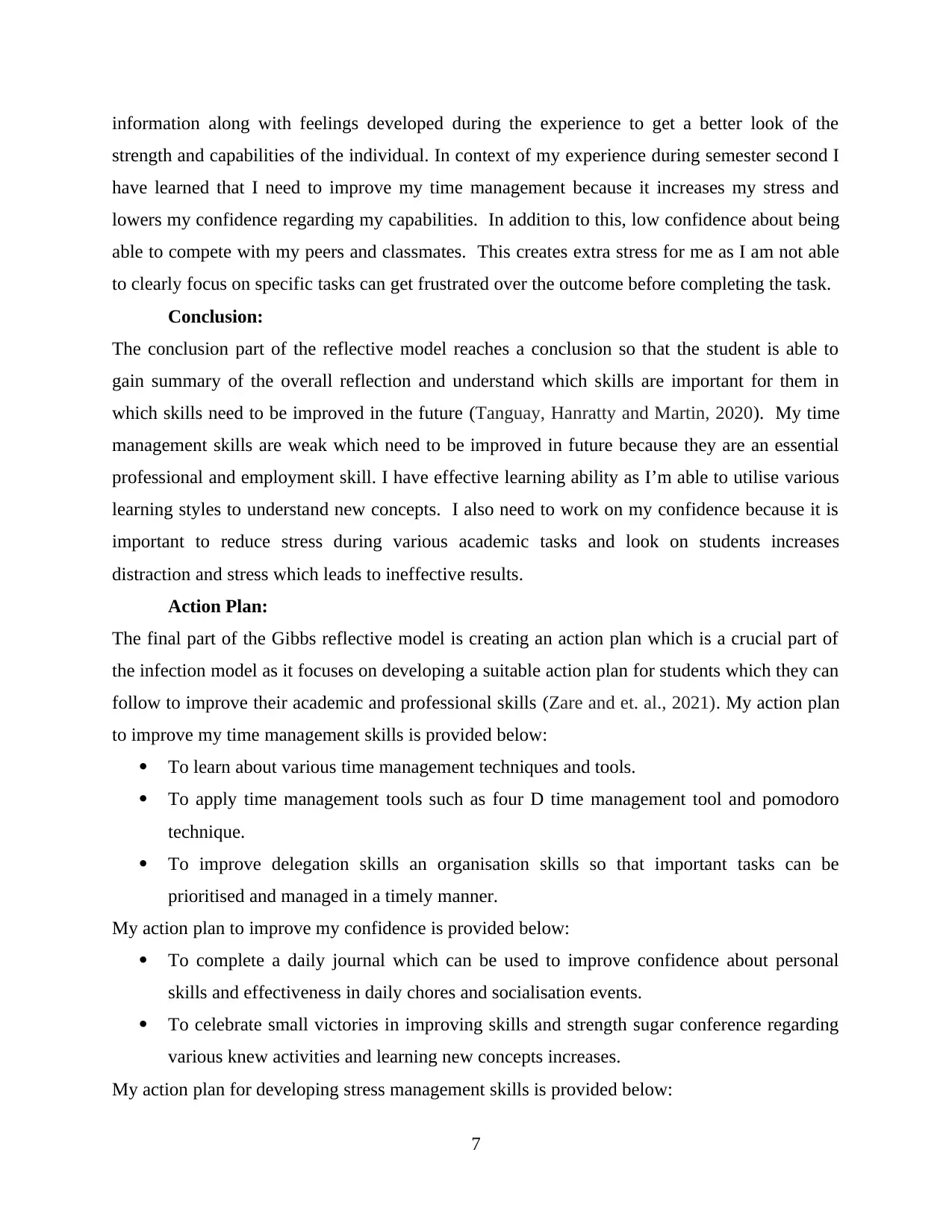
information along with feelings developed during the experience to get a better look of the
strength and capabilities of the individual. In context of my experience during semester second I
have learned that I need to improve my time management because it increases my stress and
lowers my confidence regarding my capabilities. In addition to this, low confidence about being
able to compete with my peers and classmates. This creates extra stress for me as I am not able
to clearly focus on specific tasks can get frustrated over the outcome before completing the task.
Conclusion:
The conclusion part of the reflective model reaches a conclusion so that the student is able to
gain summary of the overall reflection and understand which skills are important for them in
which skills need to be improved in the future (Tanguay, Hanratty and Martin, 2020). My time
management skills are weak which need to be improved in future because they are an essential
professional and employment skill. I have effective learning ability as I’m able to utilise various
learning styles to understand new concepts. I also need to work on my confidence because it is
important to reduce stress during various academic tasks and look on students increases
distraction and stress which leads to ineffective results.
Action Plan:
The final part of the Gibbs reflective model is creating an action plan which is a crucial part of
the infection model as it focuses on developing a suitable action plan for students which they can
follow to improve their academic and professional skills (Zare and et. al., 2021). My action plan
to improve my time management skills is provided below:
To learn about various time management techniques and tools.
To apply time management tools such as four D time management tool and pomodoro
technique.
To improve delegation skills an organisation skills so that important tasks can be
prioritised and managed in a timely manner.
My action plan to improve my confidence is provided below:
To complete a daily journal which can be used to improve confidence about personal
skills and effectiveness in daily chores and socialisation events.
To celebrate small victories in improving skills and strength sugar conference regarding
various knew activities and learning new concepts increases.
My action plan for developing stress management skills is provided below:
7
strength and capabilities of the individual. In context of my experience during semester second I
have learned that I need to improve my time management because it increases my stress and
lowers my confidence regarding my capabilities. In addition to this, low confidence about being
able to compete with my peers and classmates. This creates extra stress for me as I am not able
to clearly focus on specific tasks can get frustrated over the outcome before completing the task.
Conclusion:
The conclusion part of the reflective model reaches a conclusion so that the student is able to
gain summary of the overall reflection and understand which skills are important for them in
which skills need to be improved in the future (Tanguay, Hanratty and Martin, 2020). My time
management skills are weak which need to be improved in future because they are an essential
professional and employment skill. I have effective learning ability as I’m able to utilise various
learning styles to understand new concepts. I also need to work on my confidence because it is
important to reduce stress during various academic tasks and look on students increases
distraction and stress which leads to ineffective results.
Action Plan:
The final part of the Gibbs reflective model is creating an action plan which is a crucial part of
the infection model as it focuses on developing a suitable action plan for students which they can
follow to improve their academic and professional skills (Zare and et. al., 2021). My action plan
to improve my time management skills is provided below:
To learn about various time management techniques and tools.
To apply time management tools such as four D time management tool and pomodoro
technique.
To improve delegation skills an organisation skills so that important tasks can be
prioritised and managed in a timely manner.
My action plan to improve my confidence is provided below:
To complete a daily journal which can be used to improve confidence about personal
skills and effectiveness in daily chores and socialisation events.
To celebrate small victories in improving skills and strength sugar conference regarding
various knew activities and learning new concepts increases.
My action plan for developing stress management skills is provided below:
7
Paraphrase This Document
Need a fresh take? Get an instant paraphrase of this document with our AI Paraphraser
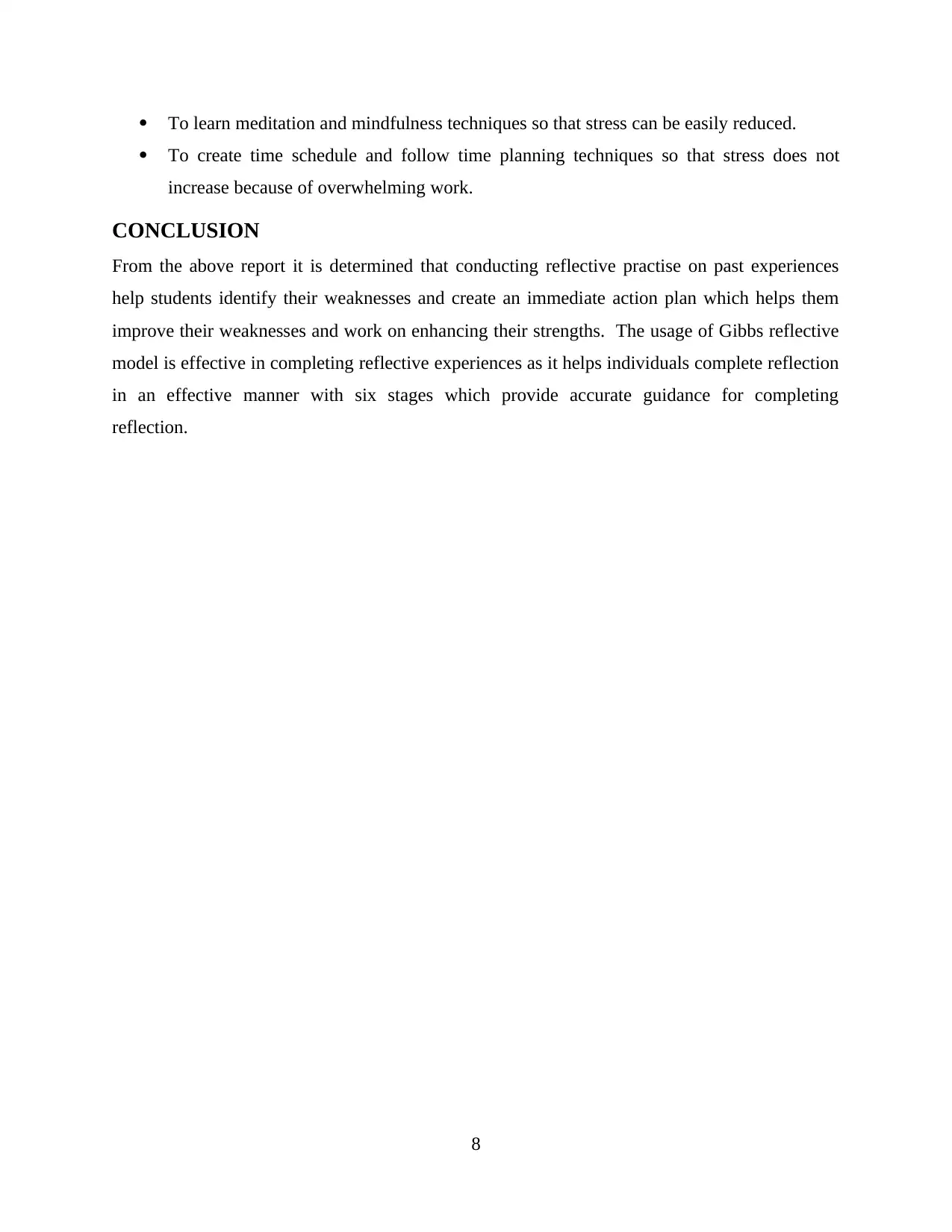
To learn meditation and mindfulness techniques so that stress can be easily reduced.
To create time schedule and follow time planning techniques so that stress does not
increase because of overwhelming work.
CONCLUSION
From the above report it is determined that conducting reflective practise on past experiences
help students identify their weaknesses and create an immediate action plan which helps them
improve their weaknesses and work on enhancing their strengths. The usage of Gibbs reflective
model is effective in completing reflective experiences as it helps individuals complete reflection
in an effective manner with six stages which provide accurate guidance for completing
reflection.
8
To create time schedule and follow time planning techniques so that stress does not
increase because of overwhelming work.
CONCLUSION
From the above report it is determined that conducting reflective practise on past experiences
help students identify their weaknesses and create an immediate action plan which helps them
improve their weaknesses and work on enhancing their strengths. The usage of Gibbs reflective
model is effective in completing reflective experiences as it helps individuals complete reflection
in an effective manner with six stages which provide accurate guidance for completing
reflection.
8
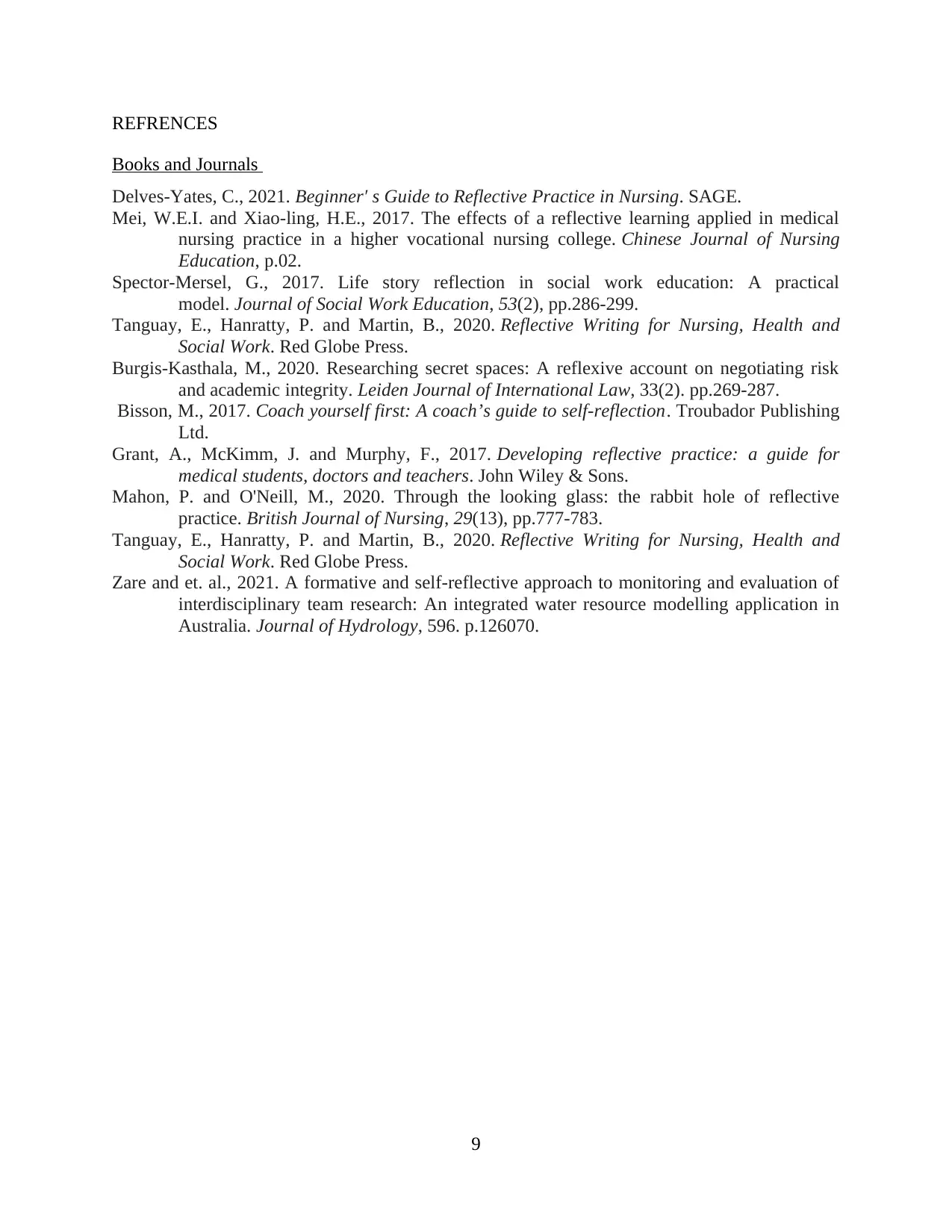
REFRENCES
Books and Journals
Delves-Yates, C., 2021. Beginner′ s Guide to Reflective Practice in Nursing. SAGE.
Mei, W.E.I. and Xiao-ling, H.E., 2017. The effects of a reflective learning applied in medical
nursing practice in a higher vocational nursing college. Chinese Journal of Nursing
Education, p.02.
Spector-Mersel, G., 2017. Life story reflection in social work education: A practical
model. Journal of Social Work Education, 53(2), pp.286-299.
Tanguay, E., Hanratty, P. and Martin, B., 2020. Reflective Writing for Nursing, Health and
Social Work. Red Globe Press.
Burgis-Kasthala, M., 2020. Researching secret spaces: A reflexive account on negotiating risk
and academic integrity. Leiden Journal of International Law, 33(2). pp.269-287.
Bisson, M., 2017. Coach yourself first: A coach’s guide to self-reflection. Troubador Publishing
Ltd.
Grant, A., McKimm, J. and Murphy, F., 2017. Developing reflective practice: a guide for
medical students, doctors and teachers. John Wiley & Sons.
Mahon, P. and O'Neill, M., 2020. Through the looking glass: the rabbit hole of reflective
practice. British Journal of Nursing, 29(13), pp.777-783.
Tanguay, E., Hanratty, P. and Martin, B., 2020. Reflective Writing for Nursing, Health and
Social Work. Red Globe Press.
Zare and et. al., 2021. A formative and self-reflective approach to monitoring and evaluation of
interdisciplinary team research: An integrated water resource modelling application in
Australia. Journal of Hydrology, 596. p.126070.
9
Books and Journals
Delves-Yates, C., 2021. Beginner′ s Guide to Reflective Practice in Nursing. SAGE.
Mei, W.E.I. and Xiao-ling, H.E., 2017. The effects of a reflective learning applied in medical
nursing practice in a higher vocational nursing college. Chinese Journal of Nursing
Education, p.02.
Spector-Mersel, G., 2017. Life story reflection in social work education: A practical
model. Journal of Social Work Education, 53(2), pp.286-299.
Tanguay, E., Hanratty, P. and Martin, B., 2020. Reflective Writing for Nursing, Health and
Social Work. Red Globe Press.
Burgis-Kasthala, M., 2020. Researching secret spaces: A reflexive account on negotiating risk
and academic integrity. Leiden Journal of International Law, 33(2). pp.269-287.
Bisson, M., 2017. Coach yourself first: A coach’s guide to self-reflection. Troubador Publishing
Ltd.
Grant, A., McKimm, J. and Murphy, F., 2017. Developing reflective practice: a guide for
medical students, doctors and teachers. John Wiley & Sons.
Mahon, P. and O'Neill, M., 2020. Through the looking glass: the rabbit hole of reflective
practice. British Journal of Nursing, 29(13), pp.777-783.
Tanguay, E., Hanratty, P. and Martin, B., 2020. Reflective Writing for Nursing, Health and
Social Work. Red Globe Press.
Zare and et. al., 2021. A formative and self-reflective approach to monitoring and evaluation of
interdisciplinary team research: An integrated water resource modelling application in
Australia. Journal of Hydrology, 596. p.126070.
9
⊘ This is a preview!⊘
Do you want full access?
Subscribe today to unlock all pages.

Trusted by 1+ million students worldwide
1 out of 9
Related Documents
Your All-in-One AI-Powered Toolkit for Academic Success.
+13062052269
info@desklib.com
Available 24*7 on WhatsApp / Email
![[object Object]](/_next/static/media/star-bottom.7253800d.svg)
Unlock your academic potential
Copyright © 2020–2026 A2Z Services. All Rights Reserved. Developed and managed by ZUCOL.




